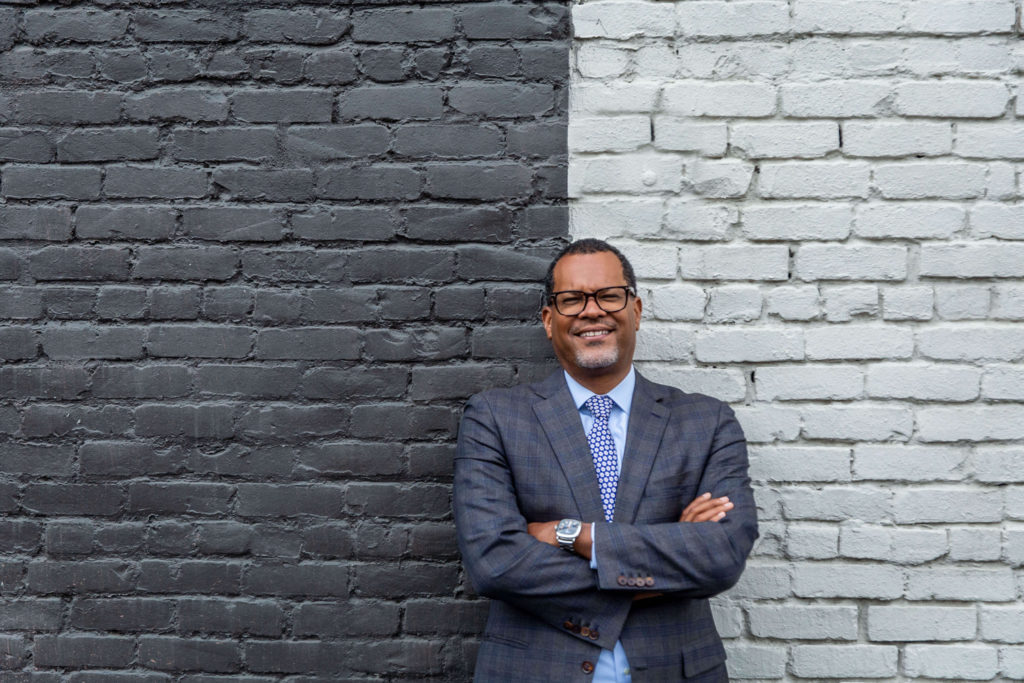I’ve had many different positions, but only one job. And that job is to work at the intersection of economic justice, social justice and place.
Fred Blackwell, SFF CEO (2014–Present)
Navigating by Our North Star: The Equity Agenda
How does a person develop an overwhelming drive to help others?
For SFF CEO Fred Blackwell, it began when he was a child riding his bicycle around Oakland. “You really get a different kind of picture of a community than you get in a bus or car,” Blackwell recalls. “I remember thinking very vividly there were some places that had the green grass, the lawns, the nice parks, and even nice infrastructure like libraries. But then I could quickly find myself in a part of Oakland where the grass wasn’t green. … There weren’t nets on the hoops. There were cracks in the concrete.”
Blackwell was inspired to fix these cracks: not just the ones on the pavement, but also the ones that splinter society into the haves and the have-nots.
Surrounded by family members dedicated to their Oakland community, Blackwell had many models of how to help. His mother, Angela Glover Blackwell, an attorney and civil rights advocate, participated in city council meetings—to which she often brought her son Fred. In 1987, she founded the Urban Strategies Council, a regional research and advocacy organization with the goal of reducing persistent poverty and improving outcomes for children and families in the East Bay. Blackwell still remembers noticing the logo on one of the early grant letters his mother received and wondering, “What kind of institution is providing support to people like my mom?”
That logo belonged to the San Francisco Foundation.
Fun fact:
Our current CEO Fred Blackwell first became part of SFF back in 1996 as part of the Multicultural Fellowship Program, a vital part of our organization that offers meaningful work experiences to early-career professionals from diverse backgrounds.
Not long after, Fred Blackwell found himself working at SFF as one of our Multicultural Fellows in the 1990s, followed by a position leading an initiative in West Oakland. He stayed in the philanthropic sector, becoming director of the Making Connections Initiative at the Annie E. Casey Foundation in Oakland’s Lower San Antonio neighborhood. That work made him curious about the public sector, which he believed was capable of effecting great change in the communities he hoped to serve. Blackwell became director of the mayor’s Office of Community Development in San Francisco, executive director of the San Francisco Redevelopment Agency, and interim city administrator for the city of Oakland. These varied efforts within local government helped him better understand how to get necessary services and infrastructure to vulnerable families.
After working in many capacities in the Bay Area, it was clear to Blackwell that most societal problems did not conform to neat jurisdictional boundaries. Drawn to our regional focus and legacy of impactful work, he returned to SFF in 2014 as CEO.
An Agenda Rooted in Community
His first order of business? Blackwell, along with SFF staff, went on an extensive listening tour.
“To do this work,” says Retha Robinson, director of one of our longest-running programs, the Daniel E. Koshland Civic Unity Program, “you have to be out there in the community and let them know that we’re hearing you. The trust that you want to build, you can’t build it from being inside your offices and on the telephone talking to people.”
Our 2014 listening tour—VOICE Bay Area—included seven in-person sessions across the region to reach the diverse areas SFF serves. Each session fostered conversation between residents, community leaders, public officials and foundation staff, giving the latter an opportunity to hear directly from people about their experiences and struggles in their own neighborhoods. “I think people saw the foundation in a different light when we were out there in the community like that,” Robinson says.
In 2015, we also hosted consultative sessions for nonprofits, funders, policymakers, academics and evaluators to inform our strategy. Additionally, we worked with PolicyLink to begin developing the ambitious Bay Area Equity Atlas (introduced in 2019) to provide much-needed data underscoring the lived experiences of the communities SFF serves. While certain topics such as housing, education, health care and jobs came up repeatedly, one theme touched them all: a lack of racial and economic equity.
To Blackwell and our colleagues, it became urgent to explicitly center racial equity and economic inclusion in all of our work. Early drafts of our new strategy were discussed with donors and community members, and on June 16, 2016, with the approval of the Board of Trustees, we officially unveiled the Equity Agenda.
Operationalizing the Equity Agenda
“Equity,” Blackwell says, “is fair inclusion in society where all can participate, prosper and reach their full potential.” While focusing on economic and racial inequities is in line with SFF’s social justice fabric, making it our North Star was groundbreaking. As Retha Robinson explains, “Now we’re naming it, calling out the racial issues, calling out the economic issues.”
Positioning the Equity Agenda as SFF’s North Star required not just ideological but also structural change. Most notable were the changes to our Community Impact department, which shifted from traditional issue tracks to three interconnected pathways. Named People, Place and Power, these teams work together, along with SFF’s other departments, to deal with the underlying causes of inequity.
What hasn’t changed, however, is our commitment to achieving for Bay Area residents what they most want for their future: the ability to get a good-paying job, live in a safe and affordable home, and exercise their political voice. The Bay Area we imagine is one where a child riding a bike will be impressed only by the joy and belonging emanating from all corners of this place.

